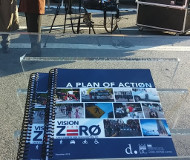12/17/2015
OPINION: DC Mayor Has a Vision Of ZeroesWashington, DC mayor will massively expand speed camera use, lower speed limits and raise fines to generate more revenue.

Muriel Bowser, recently elected mayor of Washington, DC, has adopted all of the latest trends in municipal transportation planning. At a press conference Wednesday she released her "Vision Zero" action plan, which revolves around a speed camera expansion so vast that the District would become the nation's leader when it comes to bolstering a city budget with automated ticketing. Call it a "Vision of Zeroes."
With 146 ticketing cameras, the District of Columbia has never been short of automated enforcement. In 2013, the city's for-profit camera vendor, American Traffic Solutions (ATS), issued 2,398,136 tickets -- four citations for each resident -- worth $171,680,640. Bowser's action plan will lower speed limits and install a hundred new automated ticketing machines to collect fines raised to a $1000 maximum.
According to the District Department of Transportation's proposed rule, speed limits will be lowered to 15 MPH on any road near a "playground, recreational facility, pool, athletic field, or senior center." The same limit will apply to school zones around the clock, allowing tickets to be issued at midnight to ensure the safety of school children. If there is a police car happens to be on the side of one of these roads with flashing lights activated, traffic must crawl past at just 5 MPH or face a new $500 ticket.
While the $1000 speed ticket is reserved for those driving 25 MPH over the posted limit, that is often a reasonable speed in Washington. The limit on Interstate 395 has been lowered to 40 MPH. Just over the Virginia border on the same stretch of road, the speed limit tops out at 65 MPH. Failing to notice the speed limit sign on the DC side of the river, which is often blocked by trucks and other traffic, would earn a $1000 fine in the mail if the city council approves the new fine schedule. Bowser's glossy color brochure touting Vision Zero claims these "tough" measures are needed for safety.
"While we have always prioritized safety, Vision Zero marks a new approach to our transportation challenges, and a renewed sense of urgency within our city," Bowser wrote.
The safety justification rings hollow. An analysis of accident records conducted last year by Howard University researchers found that the District and its for-profit vendor placed cameras on safe, high-volume roads, not locations with a history of fatal accidents (view study). An extensive 2005 investigation by the Washington Post found accidents doubled where red light cameras were used (view report).
According to the city's own statistics, only 3.1 percent of accidents were caused by drivers who ignored the posted speed limit, and 2 percent were caused by red light running. Cameras do not target the primary cause of accidents -- distracted driving. Instead, the District is notorious for positioning its speed cameras in locations specifically designed to target commuters in neighboring states. The good news for them is that the city admits commuters can get away with ignoring DC photo tickets as long as they do not park on city streets.
"The Departments of Motor Vehicles for Maryland and Virginia do not participate in data reciprocity for non-moving violations," the Vision Zero plan states. "For this reason, habitual offenders know that so long as they are not apprehended in person, they can refuse to pay fines designed to deter dangerous behavior. These drivers can continue to renew their vehicle registrations despite unpaid safety violations in the District."
The city says 20,000 vehicles currently have fifteen or more unpaid tickets. Bower's extensive proposal includes dozens of other plans to inconvenience motorists, including taking away driving lanes and converting them to bus-only and bicycle routes, setting up drunk driving roadblocks on weekends, massive hikes in the penalties for miscellaneous driving offenses and the use of "traffic calming" to take away space for automobiles.
Several of the proposals were introduced last week in a city transportation department rulemaking that has a public comment period open until January 9. The new fines and penalties will take effect 45 days after the final rule is adopted, unless the action is vetoed by the city council.


